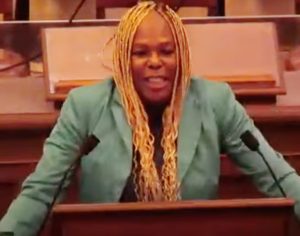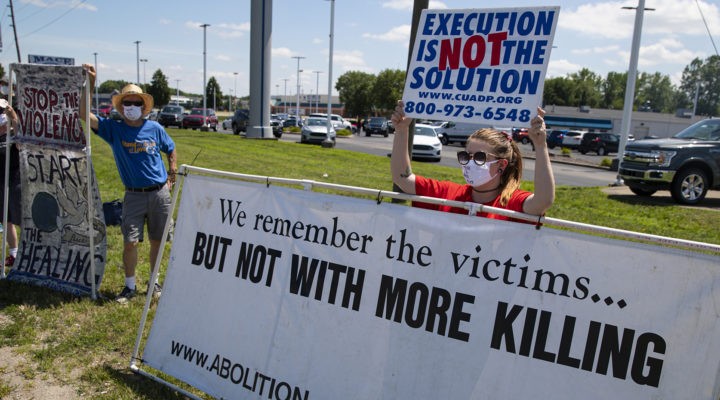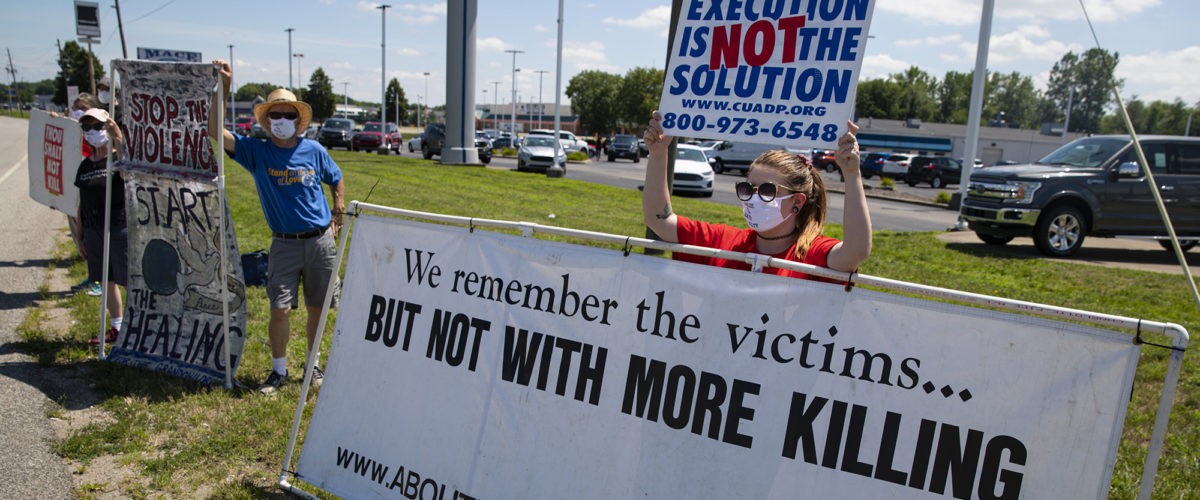Among the many failings of capital punishment is its disproportionate use against people of color, its failure to deter violent crime and the spiritual and emotional trauma it inflicts on families, jurors and prison guards, death penalty abolitionist Michael Stone said.
But perhaps the most disturbing of all is that innocent people can — and have been — wrongly convicted and executed, Stone said during the Mabel Palmer Lecture Series hosted recently by St. Charles Avenue Baptist Church in New Orleans.
The ratio is one exoneration for every 8.2 executions, an error rate of about 12% of U.S. capital murder cases, he said. “Now, would you get on an airplane if 12% of them crashed? Or would you drive a car if 12% of the time it ends up in a fatal accident? No. So why in heaven’s name are we continuing with a death penalty system that is that bad?”

Michael Stone
Stone serves as executive director of Virginians for Alternatives to the Death Penalty, which led the successful campaign to abolish Virginia’s death penalty in 2021. His keynote on “Addressing the Death Penalty in Louisiana” was followed by presentations from Lavergne Thompson, the widow of a Death Row exoneree, and social justice attorney Alison McCrary.
Stone opened with statistics showing Louisiana ranked 13th nationwide in numbers of executions since the death penalty was reinstated in 1976, with 28. Texas (589), Oklahoma (125) and Virginia (113) topped the list.
As of July 1, the state had 63 Death Row inmates, nearly double the 34 in Oklahoma but well behind California’s 632, Florida’s 288 and Texas’ 180. “And 12 people who were sentenced to death here in Louisiana were later found to be innocent,” he added.
The last time Louisiana executed an inmate was in 2010, but Gov. Jeff Landry and conservatives in the Legislature have been making moves to resume the practice. Landry signed legislation in March adding nitrogen hypoxia and the electric chair as alternatives to lethal injection.
Stone also delved into Louisiana’s history of lynching, the mostly Southern practice that predated and inspired the eventual creation of formal capital punishment.
During the Reconstruction period from 1865 to 1876, more than 1,000 lynchings were documented in Louisiana, with another 718 deaths in mass killings. Nearly 550 lynchings were recorded in the state from 1877 to 1950.
“Louisiana was third in the number of documented lynchings. Again, it’s ‘documented’ because there were many more lynchings that have never really received any kind of documentation in a local newspaper or any other place,” he said.
The racism that animated lynching crossed into the use of the death penalty in many states, including Louisiana, Stone said. “Overwhelmingly, the places where lynchings were common is where legal executions took place subsequently, and also again overwhelmingly in the Mid-Atlantic and South.”
“The average murder rate in states with the death penalty is 5.37 per 100,000 people. In states without the death penalty, it’s 4.17.”
He cited a University of North Carolina at Chapel Hill study of capital homicide cases in Louisiana from 1976 to 2014, which found homicides involving Black suspects and white victims represented 11.4% of all murders, yet 41% of all death sentences during that time frame.
The racial disparity inherent in capital punishment is one of the main arguments death penalty opponents should be highlighting in abolition campaigns, Stone said. “As of about six years ago, nationwide, there were 20 white defendants executed for killing Black victims, but 288 Black defendants executed for killing white victims. Homicides with a Black male suspect and a white female victim were more than five times as likely to lead to a capital charge or death sentence.”
Another weakness abolitionists can exploit is the failure of the death penalty to prevent or even reduce violent crime, he continued. “The average murder rate in states with the death penalty is 5.37 per 100,000 people. In states without the death penalty, it’s 4.17.
“Now, one would think if the death penalty were a deterrent, those numbers would be flipped, but they’re not,” he said. “There was an annual poll of police chiefs asking them the most effective method of preventing violent crime, including homicide. In every poll, the death penalty was dead last.”
There’s also the distress capital punishment can bring to victims’ and inmates’ families and to anyone connected to the system, Stone said. “Jurors can be broken and traumatized by the system. Former executioners have publicly talked about the trauma they’ve experienced. A number of these guys talk about being visited in the dreams by the people they executed.”
Stone urged activists to recognize the trauma, to stage protests and vigils and to build relationships with death penalty supporters on reforms many can agree on, such as not executing people with mental disabilities. Abolition also requires passionate attorneys, grassroots organizing, support of racial justice initiatives and patience, he advised.

Lavergne Thompson
“We are dealing with a profound evil when we talk about the death penalty because we are talking about the intentional killing of a human being. It is a terrible crime and a sin against God’s created order.”
Lavergne Thompson said her inspiration for death penalty abolition work began with the 2003 exoneration of her late husband, John Thompson.
“In 1985 he was arrested at the age of 22 for a crime he didn’t commit which later became two crimes he didn’t commit,” she explained. “John spent 18 years in prison — 14 years on Death Row — fighting for his life.”
Once released he became active in speaking out against capital punishment and in support of Death Row inmates and other exonerees, she said. “My husband is like a hero. He came home doing a lot of great work for the city and the community.”
Death penalty opponents need to make sure legislators know about the evils of capital punishment, McCrary said.
“A lot of them don’t get calls in support of the death penalty, but we need to make our voices heard that we are against this and not allow the killing of human beings to be used as political tools for people to be elected or to appear tough on crime.”
Related articles:
Evangelicals could kill capital punishment system if they would, speakers declare
Opposition to death penalty gaining steam through broad coalition


